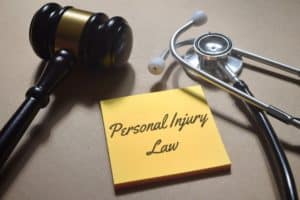Victims of injuries can pursue damages based on their expenses and losses. Those liable for the injuries are legally responsible for paying for these damages, often through an insurance policy. Economic damages compensate the victims for their monetary expenses and losses current and future costs related to their accidents and injuries.
Can You Give Me Examples of Economic Damages?

Economic damages are recoverable damages that have a tangible monetary value. They can be expenses already paid, upcoming bills, financial losses, or even estimated future costs. They vary widely from case to case, with many factors affecting the covered losses and their value. In general, the worse the victim’s injuries, the higher the economic damages. However, this is not always true.
For example, a fatal accident settlement might not account for as many medical care costs and ongoing support expenses as a victim with catastrophic injuries. Someone who can recover with intensive rehabilitation, such as someone with a partial spinal cord injury, might pay more for their inpatient therapies than someone with a complete transection injury. Insurers, judges, juries, and personal injury attorneys must evaluate each case based on its own facts.
Some common examples of economic damages in a personal injury case include the following:
Medical Care Costs
Treatment for accident-related injuries is often the largest expense after a personal injury. These costs include:
- Ambulance or medevac transfer from the accident scene
- Emergency department assessment and stabilization
- Hospitalization
- Treatment
- Rehabilitation and therapy
- Follow-up care
- Medications
- Wheelchairs, walkers, and other mobility tools
- Other equipment as needed
- In-home nursing visits and other support, if required
You may recover almost any expense related to your medical treatment and care if evidence documents the expense and can tie it to your accident injuries.
Lost Income
Most people hurt in a negligence accident miss work. They cannot earn income as they normally would, making a stressful situation worse. This occurs no matter how they earn a living. For this reason, income loss benefits do not only apply to salaries or hourly wages.
Instead, victims can recover income missed normally earned through:
- A paycheck
- Contract labor
- Tips
- Commissions
- Gig work
- Self-employment
A victim may recover future lost income and reduced ability to work if their injuries will prevent them from returning to their previous career or working as many hours as they previously worked.
Property Damages
If you have damage to any of your personal property because of the incident, you can demand money to repair or replace it. The most common application of this is to repair or replace a vehicle damaged in a traffic accident. However, it also applies to other personal property in other types of injury accidents.
Imagine you suffered injuries in a fall due to a spill at a local restaurant. When you fell, your eyeglasses broke. In some cases, you could include the cost of your glasses replacement in your claim for property damages.
Miscellaneous Related Expenses
There are some out-of-pocket expenses victims spend that constitute recoverable damages. Keep all your receipts from any related purchase during this time. Your attorney can help you understand what might qualify. There is a wide range of related expenses in these cases.
Some examples include:
- Parking at the hospital
- Traveling to see a specialist
- Renting a car if yours was totaled
- Retrofitting a new vehicle for new disabilities
- Renovating a home, such as widening doorways, constructing a wheelchair-friendly bathroom, or building a ramp
Future Costs
Failing to consider the long-term expenses and losses after an accident is a mistake for those with serious or lasting injuries. You do not want to pay these costs out of your pocket. Some people require medication, follow-up care, reconstructive surgery, and other medical care for years after an accident. This also means missing work for appointments, leaving them with additional lost income.
When catastrophic injuries occur, future expenses center on ongoing care and support costs. They could range from replacing old mobility aids to round-the-clock care in a long-term care facility. If they cannot return to their previous job, it could also consider their income losses. Your attorney could refer to this as diminished earning capacity or a similar phrase.
Identifying and Valuing Economic Damages After a Personal Injury Accident
One of the most difficult parts of a personal injury case involves showing the insurer, at-fault party, judge, and/or jury how much the case is worth. They often agree that the negligent party caused the incident and injuries but do not believe the victim suffered as much economic and non-economic harm as they claim. You must have strong evidence to get a fair recovery.
You should keep all bills, receipts, and other documents from the first day of your accident until it is time to negotiate a fair settlement.
The steps necessary to value these cases involve:
- Gathering all bills
- Determining which receipts are for recoverable damages
- Calculating losses
- Estimating future damages
- Adding these totals to determine the economic damages
Many people leave thousands of dollars or more on the table because they do not accurately value their case. They do not calculate a fair settlement value and demand the insurer pay them accordingly. They either accept an amount that sounds like a lot of money or do not trust that their case is worth more than the insurer initially offers them.
Never accept the first offer. The insurance company hopes you will not know how much your case is worth and will settle for much less because you want it over with or you failed to consider your future and non-economic damages.
Future Damages
Future damages are difficult to estimate for individuals. Law firms generally work with medical experts to understand the individual’s prognosis, ongoing care and support needs, and the cost of these services. In addition, income losses and other expenses could continue. Overlooking any of these expenses could greatly reduce the value of your case and leave you paying them on your own later.
Non-Economic Damages
Non-economic damages are much more difficult to value, but this is essential to ensuring you get the money you deserve for your losses. Sometimes called pain and suffering, non-economic damages are intangible. They are physical and emotional, so they don’t have a financial value naturally assigned to them. There are no bills or receipts.
For that reason, most law firms and insurance companies estimate a value using the economic damages from the incident or another method. This is not something a victim can accurately do on their own, so you should always discuss your case with an attorney before signing an agreement with the at-fault party or their insurer.
Punitive Damages
Punitive damages are not available in most personal injury cases. Each state has its own laws about when they are recoverable, what victims have to prove, and caps on them. Punitive damages do not compensate a victim for any type of expense or loss. Instead, they penalize the at-fault party for wanton recklessness, intentional acts, or other extremely bad and dangerous behavior.
How to Obtain Damages After a Personal Injury Accident?
The most common way to obtain a payout following a negligence accident is to file an insurance claim or a lawsuit. These actions allow victims to demand fair and just compensation from the party who caused their accident and injuries. Their insurer most commonly pays the amount negotiated during settlement talks or mediation. When a case goes to trial, the judge or jury issues a verdict and could award compensation.
Building a personal injury case requires proving that the at-fault party the defendant in a lawsuit acted negligently. Claimants must demonstrate negligence in almost all cases unless the defendant instead caused your accident intentionally. Negligence occurs when one party acts carelessly or recklessly, putting others in danger.
You must show four elements of negligence exist in your case.
- A duty of care, meaning the at-fault party had an obligation to do something or not do something specific
- A breach of duty, meaning they failed to follow the law or uphold their obligation
- Causation, meaning their breach of duty caused the accident
- Harm, meaning physical, emotional, or financial damage
An Example of Proving Liability
When you consider a car accident case, the duty of care usually comes from a traffic law. A driver approaching a stop sign must stop at that sign. When they breach that duty and do not stop, it could cause an accident and injuries.
To prove negligence, victims need to show:
- The defendant violated a traffic law or was otherwise negligent or reckless
- That this violation directly caused the accident
- That the accident caused their injuries
Hiring an Attorney Can Make the Legal Process Easier to Navigate
Working with a lawyer is generally the easiest way to manage these cases. They handle investigating the incident, documenting your injuries, and valuing your case. When you work with a law firm, you have someone with the experience and knowledge to prove your case on your side. This also lets you focus on your healing while they worry about paying for your treatment and recovering lost income on your behalf.
Attorneys can make personal injury claims easier to navigate and less stressful. They generally work based on contingency fees, too. They do not ask clients to pay them up front. There are no retainers to pay. Instead, they pay for all the upfront expenses and only charge attorney’s fees after the case ends, and they recover compensation for you.
How a Lawyer Can Support Your Claim for Damages?
The steps necessary to gather evidence in personal injury cases can be difficult even if you are not still recovering from serious injuries. Your attorney can manage these for you while you continue your treatment and physical recovery.
They include:
- Obtaining any police reports or other official documents
- Requesting relevant medical records
- Interviewing eyewitnesses
- Surveying the scene where the accident occurred
- Working with accident reconstructors when needed
- Talking to medical experts
- Seeking video or photographs from the scene
- Documenting damages
Having an attorney on your side is especially important if you might need to sue the at-fault party. This occurs for numerous reasons. Some examples include when:
- The state’s statute of limitations runs out.
- The insurer refuses to offer a fair settlement.
- The insurer denies the claim.
- There are significant questions about the facts of the case.
- Punitive damages might be available.
- There are other reasons why your attorney recommends it.
You do not want to try to handle a personal injury lawsuit on your own. Even managing your own insurance claim could leave a lot of money on the table, and you might have to pay any future expenses or care needs out of your own pocket. Working with an attorney can help ensure you get fair compensation after a personal injury.
Work With an Attorney Who Can Help You Seek Damages After an Accident

Many personal injury lawyers provide free consultations for accident victims. They assess the case, discuss options, and offer information about services and strategies that might make it possible to recover fair and just compensation based on what happened. This is the best way to get justice after someone else’s bad behavior costs you thousands of dollars in medical bills, lost income, and other economic damages.
If you are considering filing a claim or lawsuit, contact an attorney’s office online or over the phone as soon as possible. They can evaluate your options with you for free and represent you based on contingency. You should not need to pay anything up front to hire a personal injury lawyer to handle your case.